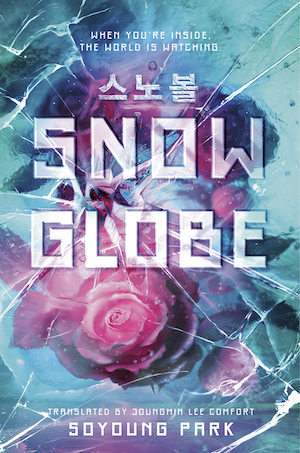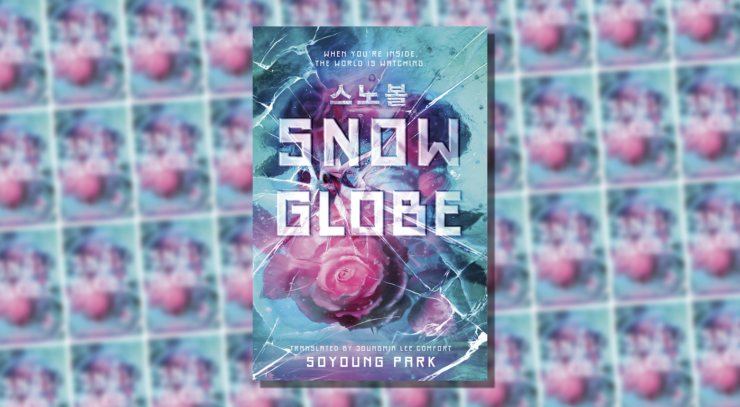Originally released in South Korea in 2020 when the entire world was standing still at the height of COVID-19, Soyoung Park’s dystopian YA novel Snowglobe provided South Koreans a chilling (pun intended) escape into a world that eerily mirrored their own. The difference was, instead of a pandemic, the people in Snowglobe were stuck in a frozen wasteland, a constant state of winter with subzero temperatures. In this future set in the Korean peninsula, the only place with regulated temperatures and a semblance of a “normal” life was inside Snowglobe—a city built on top of a geothermal vent and in a weatherproof glass dome by the Yibbon Media Group.
Jeon Chobahm and her family, like the majority of people, do not live inside Snowglobe. Instead, they live in the outer settlements where temperatures are -50 degrees, and work at their local power plant on literal human hamster wheels that generate electricity that powers Snowglobe. In exchange, Snowglobe citizens, who are also actors, must have their lives broadcasted 24/7 for the rest of the world’s entertainment.
Our heroine, Jeon Chobahmn, spends her monotonous days sprinting on a wheel that goes nowhere and her nights dreaming of becoming a director for Snowglobe and watching her favorite show, Goh Around, starring Goh Haeri, the megastar whose entire life has been broadcasted on-air for the world to see. Maybe it’s because Chobahm looks like her or because they share the same birthday, or maybe because she has watched Haeri her whole life. No matter the reason, Chobahm has always had an affinity for Haeri.
Buy the Book


Snowglobe
So when a black limousine carrying Snowglobe’s most famous director, who is responsible for turning Haeri into a global phenomenon, shows up looking for Chobham, she is shocked. It turns out her beloved Haeri has died and Director Cha wants Chobahm to fill in and pretend to be the Goh Haeri. With the promise of her family being taken care of financially and assurance that Director Cha will help in her pursuit of becoming a director, Chobahm agrees. Because, after all, this is what she’s always wanted—a ticket out of this bleak, tedious life and into a glamorous one awaiting for her in Snowglobe. A real chance to do something with her life, to be someone special.
But when she gets there, she realizes that you shouldn’t believe everything you see on TV. As Chobahm assumes Haeri’s identity and life, she finally gets a peek behind the proverbial curtain and sees for herself the manipulation and deception that happen off-camera, behind closed doors. Nothing inside Snowglobe is what it seems to be.
From the very first page until the last, this book was action-packed and full of twists and turns. The pacing of the novel was deliciously fast, made evident by the way I devoured this book in two sittings. Park wastes no time in laying down the foundation for an expansive world-building that goes beyond the frozen wasteland and into the surreal world of Snowglobe—one I hope she will expand on in the second and final book of this duology (slated to release in 2025).
And the structure of this novel—first focusing on the smallness of Chobahm’s daily life and then expanding to the immense and unfamiliar world of Snowglobe—was really important in bringing the reader along Chobham’s journey, making her an incredibly relatable, if sometimes unlikeable, character. This book was pure fun and I wasn’t expecting anything less. But it was also surprisingly layered and insightful.
Like many popular South Korean media, Park explores themes of socioeconomic status and class. If you are even mildly familiar with Korean media, you’ve heard of Squid Games and Parasite, both prime examples of commentary on classism in South Korea. (In fact, as I am writing this, the producers of Parasite have picked up the film rights for this book.) Historically, Korean culture has deeply rooted Confucian beliefs, especially on social positions and maintaining social hierarchies. Basically, every person has a role and place to produce harmony in society, for the greater good. This collective mindset is not unique to Korea, but a well-known East Asian cultural characteristic due to the widespread Confucian ideology that ruled the area. But what is unique to Korea is the outcome of these traditional beliefs set against rapid economic growth and capitalism. Turning the country from a poverty-stricken one to the second biggest exporter of electronics, South Korea’s economy boomed within just fifty years. And along with this growth and the introduction of “chaebols” (conglomerates owned by a single family), Korea’s modernization also brought a deeper chasm in social class and widened the gap between the rich and the poor.
In Snowglobe, this economic and social disparity is magnified with the physical separation between the two classes by a literal glass dome. The Yibbons (the chaebol family who owns Snowglobe and its entire broadcasting system) and their powerful directors ultimately decide who gets to live inside Snowglobe as actors. They not only decide whose lives will be ones of luxury, but also how their lives are construed and curated as content for the world to consume. They control the narrative, the views, the money, and even the weather—all possible through the electricity that the rest of the world produces that powers Snowglobe. The top one percent exploiting the rest to stay on top is a relevant and timeless theme. The commentary on classism is obvious but effective. Park doesn’t add anything new to the topic, but she does use it as a backdrop for her more compelling critique: society’s obsession with the self-curation of our identities for social currency.
In our real world, popular reality shows and social media have normalized the idea that a person’s intimate moments can be and have become content and entertainment for the general public. Park, fueled by her fascination with identity, explores this idea that society trades “privacy as currency” on the grandest scale—a city built to pump out content and broadcast the private moments of people’s lives to the world in exchange for safety, warmth, and comfort, but also for fame. But what is the cost? For Haeri, her entire life was spent in front of cameras. Her show gained so much popularity that even after death, she had to still live on screen. There was no escape, no end. Through Snowglobe, Park forces our attention to ourselves and our own insatiable appetite for content. She asks the questions: What are you willing to sacrifice for fame? What are you willing to accept to be entertained? As the hypersharing of our personal identities become more normalized and our identities become shaped by views and likes, the price for it—whether physical, emotional or mental—is a real danger to our health. The stakes are high in Snowglobe, but they are just as high in our real world.
The book gets pretty wild at the end with a lot happening in the last hundred pages. There is a lot left that needs to be clarified and explored, but it does end with a glimpse of what, I hope, is to come—a deeper understanding of the Snowglobe world, the powers that rule it, and a day of reckoning and disruption of the status quo. I can’t wait to see how Park ends this dystopian duology.
Snowglobe is published by Delacorte Press.










